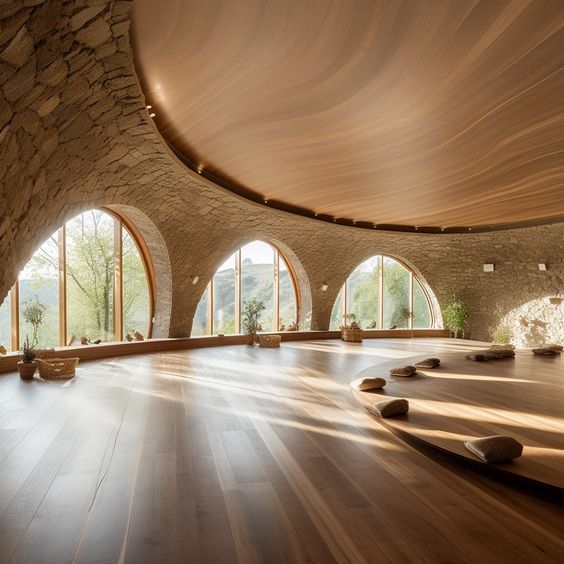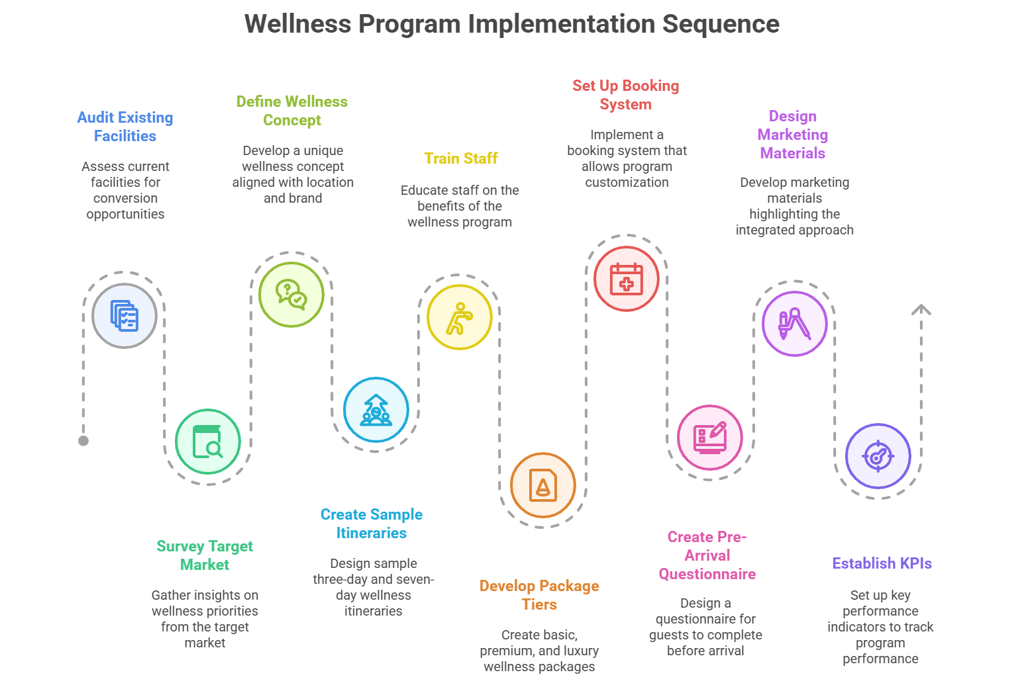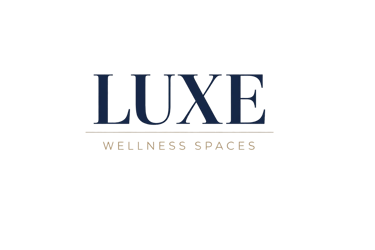Ultimate Guide: Design Integrated Wellness Programs for Resorts
Transform your resort with holistic wellness programs that boost guest satisfaction and revenue. Learn proven strategies for combining spa, fitness, and mindfulness services.
Daryn Berriman
9/27/20255 min read


Creating an integrated wellness program means connecting spa services, fitness activities, and mindfulness practices under one cohesive concept that matches your resort's brand identity. This holistic approach increases guest stays by 23% on average and boosts ancillary revenue by up to 40% compared to standalone spa services. The key is designing complementary schedules, cross-promotional packages, and personalized wellness journeys that encourage guests to experience multiple touchpoints throughout their stay.
Key Facts:
Wellness tourism market reached $651 billion globally (Global Wellness Institute, March 2024)
Integrated wellness programs increase average guest stay from 2.3 to 4.1 nights (Hospitality Net, January 2024)
76% of luxury travelers prioritize wellness amenities when booking (Skift Research, June 2024)
Properties with holistic wellness programs see 35% higher RevPAR (STR Global, April 2024)
Wellness travelers spend 53% more than average tourists (UNWTO, February 2024)
Your guests aren't looking for just a massage or gym anymore. They want transformative experiences that leave them feeling renewed in body, mind, and spirit. Smart hoteliers are responding by breaking down the walls between spa, fitness, and wellness services.
The Core Approach
An integrated wellness program weaves together physical activities, therapeutic treatments, and mental wellness practices into one seamless experience. Start by auditing your existing assets: spa facilities, fitness spaces, outdoor areas, and even unused rooms that could become meditation spaces. Next, identify your property's unique selling proposition. A beachfront resort might focus on ocean-inspired therapies and beach yoga, while a mountain lodge could emphasize forest bathing and altitude training. The goal is creating synergy where each element enhances the others. Morning fitness classes prepare the body for afternoon spa treatments. Evening meditation helps guests integrate their day's experiences. This interconnected approach keeps guests engaged throughout their stay rather than booking one treatment and spending the rest of their time by the pool.
Assessment and Planning
Begin your property assessment by mapping guest flow patterns. Where do people naturally gather? Which spaces feel underutilized? Survey your current guests about their wellness interests and pain points. Look at your competition but don't copy them. Instead, find gaps in the market.
Consider the Four Pillars Framework that successful properties use:
Movement (fitness, yoga, hiking, water sports)
Recovery (spa, massage, hydrotherapy)
Mindfulness (meditation, breathwork, journaling)
Nutrition (healthy dining, cooking classes, juice bars)
Each pillar should connect to the others through scheduling and packaging.
Real Success Story
The Ananda Resort in India transformed their business by integrating their previously separate spa and fitness departments. They created "Wellness Journeys" that combined daily yoga, Ayurvedic treatments, meditation sessions, and personalized nutrition plans. Results after 18 months: occupancy increased from 65% to 82%, average stay length grew from 3 to 7 nights, and spa revenue per guest jumped 240%. Their secret was mandatory wellness consultations at check-in where specialists created custom three-day or seven-day programs for each guest.
The Contrarian View
Not every property needs a full wellness program. Boutique hotels under 50 rooms might struggle to maintain the staff and facilities required. Some properties find success with strategic partnerships instead. Partner with local yoga instructors, visiting practitioners, or nearby wellness centers. This approach reduces overhead while still offering integrated experiences. The key is maintaining quality control and ensuring partners understand your brand standards.
Implementation Checklist
Audit existing facilities and identify conversion opportunities
Survey target market about wellness priorities
Define your unique wellness concept tied to location/brand
Create sample three-day and seven-day wellness itineraries
Train staff across departments on wellness program benefits
Develop three package tiers (basic, premium, luxury)
Set up booking system that allows program customization
Create pre-arrival wellness questionnaire for guests
Design marketing materials highlighting integrated approach
Establish KPIs to track program performance


Try This in 5 Minutes
List your property's current wellness touchpoints (spa, gym, pool, trails)
Draw connections between services that could enhance each other
Write one sample day itinerary combining three different wellness elements
Common Mistakes and Fixes
Mistake: Offering too many options without guidance. Fix: Create structured programs with flexibility for customization
Mistake: Keeping departments siloed with separate booking. Fix: Implement unified wellness concierge and booking system
Mistake: Pricing programs too high initially. Fix: Start with introductory rates to build demand and testimonials
Mistake: Ignoring staff wellness. Fix: Let employees experience programs to become authentic ambassadors
Mistake: Focusing only on female guests. Fix: Design programs that appeal to men and couples
Industry Glossary
Wellness Tourism: Travel focused on maintaining or enhancing personal wellbeing
Holistic Programming: Services addressing physical, mental, and spiritual health together
Cross-promotion: Marketing multiple services as complementary packages
Wellness Concierge: Dedicated staff member who designs personalized guest programs
Integration Points: Moments where different wellness services connect
RevPAR: Revenue per available room, key hospitality performance metric
The wellness travel market isn't slowing down. Properties that create truly integrated programs will capture more revenue per guest while building the loyalty that drives repeat visits and referrals.
FAQ's
What's the minimum investment needed to create an integrated wellness program? Basic integration can start at $50,000 by repurposing existing spaces and training current staff. This covers program design, basic equipment, staff training, and marketing materials. Full facility upgrades typically range from $200,000 to $2 million depending on property size.
How long does it take to see ROI on a wellness program investment? Most properties see positive returns within 12 to 18 months. Early indicators include increased spa bookings (usually within 3 months), longer average stays (6 months), and improved guest satisfaction scores (immediate).
Should we hire a wellness director or consultant first? Start with a consultant for program design and initial setup. They'll help you avoid costly mistakes and accelerate implementation. Hire a full-time wellness director once your program generates at least $500,000 annual revenue.
What if our property lacks space for new wellness facilities? Convert underused spaces creatively. Conference rooms become yoga studios during off-peak times. Rooftops transform into meditation gardens. Pool decks host sunrise fitness classes. Focus on programming over infrastructure initially.
How do we price integrated wellness packages? Price packages at 15% to 20% below the sum of individual services to encourage uptake. Include one premium element (like a signature treatment) to justify the price point. Aim for 40% to 50% gross margin on packages.
Which wellness trends should we incorporate versus avoid? Incorporate proven practices like yoga, meditation, and massage. Add trending elements like sound baths or breathwork carefully. Avoid fads without scientific backing. Test new offerings as limited-time experiences before permanent addition.
Do you require specialist assistance with a new wellness project, or seeking to improve the operation of your existing space? Book a free strategy call to discover how unique wellness experiences can transform your property into a destination guests choose over competitors.
Further reading on our blog: 'Top Trends in Spa & Wellness'
• Explore our Spa & Wellness Consultancy to scope project phases and services.
• See how we structure Fitness and Leisure concepts before you commit to equipment.
• Developers and luxury homeowners can review Home Wellness Spaces for private suites and villas.
• Learn why Luxe Wellness Spaces blends design, operations, and growth under one roof.
• View a Concept-to-Launch case study that hit break-even in 90 days.
About The Author
Daryn Berriman is the Founder and Principal Consultant of Luxe Wellness Spaces, a consulting-led studio blending operational expertise and design excellence to create wellness businesses that perform, and spaces that guests love.


